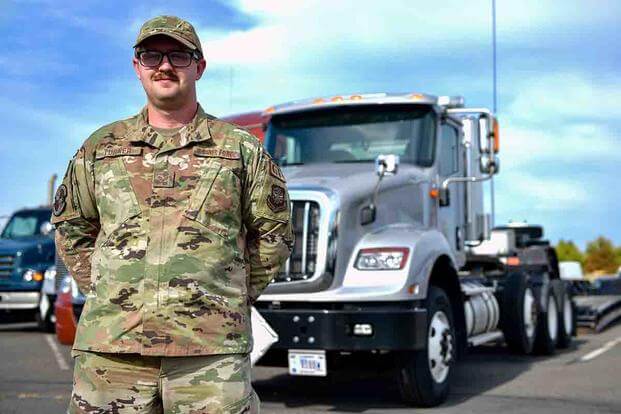The Veteran Improvement Commercial Driver License Act represents a significant milestone in enabling veterans to transition into civilian careers, particularly in the trucking industry, which faces an ongoing driver shortage. This newly passed legislation streamlines access to Commercial Driver License (CDL) training for veterans, opening doors to well-paying, in-demand jobs in transportation. Our goal is to explore the intricacies of this law, its impact on veterans, and the larger implications for the trucking industry.
Key Changes Under the Veteran Improvement Commercial Driver License Act
The primary focus of the Veteran Improvement Commercial Driver License Act is to simplify and expedite veterans’ ability to utilize their GI Bill benefits for CDL training programs. Under the previous regulations, any newly opened branch of a trucking school was required to wait two years before being eligible to accept GI Bill benefits, even if its main facility had already been approved. This two-year delay created significant hurdles for veterans looking to enter the trucking workforce promptly.
With the passage of this act, these restrictions have been removed, allowing veterans immediate access to their GI Bill benefits at newly established training facilities. This key modification addresses the following areas:
- Immediate Eligibility for New Branches: Veterans can now enroll in CDL programs at new branches of already approved schools without waiting two years.
- Consistency Across Locations: Approved institutions are recognized by both the VA and state regulatory agencies, ensuring uniformity in standards across all branches.
- Greater Geographic Accessibility: Veterans now have more flexibility in choosing training locations, reducing travel time and costs.
Benefits of the Act for Veterans
The trucking industry has long been a promising career pathway for veterans. With the Veteran Improvement Commercial Driver License Act, the transition into this field has become more accessible. Here’s how this legislation directly benefits veterans:
1. Fast-Track to Employment
Veterans can now access CDL training programs immediately after returning home, without being hampered by bureaucratic delays. This rapid entry into training means they can secure employment sooner, providing financial stability and a clear career trajectory in the trucking industry.
2. Access to High-Paying Jobs
The trucking industry is known for offering competitive wages, particularly in long-haul and specialized sectors. CDL holders are in high demand due to the nationwide truck driver shortage, and veterans who complete their training can quickly find themselves in well-compensated positions.
3. Utilization of GI Bill Benefits
The GI Bill has long been a cornerstone of veterans’ education and career development, but regulatory red tape has often limited its effectiveness. This law allows veterans to maximize their benefits by providing more options for accredited CDL training programs, including newly opened facilities.
4. Support for Veteran-Friendly Careers
Many trucking companies actively seek to hire veterans, recognizing the leadership, discipline, and teamwork skills that military service fosters. By removing barriers to CDL training, this legislation helps veterans take advantage of the numerous veteran-focused recruitment initiatives within the industry.
Impact on the Trucking Industry
The Veteran Improvement Commercial Driver License Act comes at a critical time for the trucking sector. The American Trucking Associations (ATA) has consistently highlighted the growing driver shortage, which poses a risk to the country’s supply chain and economic stability. With this act, veterans are well-positioned to help fill this gap, bringing a host of advantages to the industry.
1. Alleviating the Driver Shortage
The ATA estimates that the U.S. faces a shortfall of over 80,000 truck drivers. This shortage has strained the logistics sector, causing delays in goods delivery and increased operational costs for companies. Veterans, with their unique skill sets and discipline, are an ideal demographic to help mitigate this shortage. By expanding access to CDL programs, the legislation provides a steady pipeline of qualified drivers into the industry.
2. Reducing Turnover Rates
Veterans who enter the trucking industry through targeted recruitment efforts tend to demonstrate higher retention rates compared to other demographic groups. The military experience prepares individuals for the long hours and challenging conditions that are often part of the trucking profession. Lower turnover rates lead to cost savings for trucking companies, as they can invest less in recruitment and training while maintaining a stable workforce.
3. Enhancing Industry Diversity
The integration of more veterans into the trucking workforce adds to the industry’s diversity. Veterans bring unique perspectives, problem-solving abilities, and leadership experience, all of which enhance the operational efficiency and culture within trucking companies.
Legislative Backing and Bipartisan Support
The Veteran Improvement Commercial Driver License Act garnered strong bipartisan support in both the House and Senate, reflecting a shared understanding of the importance of veterans’ issues and the nation’s transportation needs. The bill’s unanimous passage in the Senate and voice vote approval in the House underscore the urgency of addressing the veteran employment gap and the trucking shortage simultaneously.
Key lawmakers, including Senators Fischer and Padilla and Representatives Edwards and Pappas, were instrumental in pushing the bill through Congress. Their leadership highlights the ongoing commitment to supporting veterans’ transitions to civilian life while simultaneously addressing critical workforce challenges.
Future Implications for Veterans and Trucking
As the trucking industry continues to evolve with advancements in technology, automation, and logistics management, veterans will play an increasingly important role in shaping its future. By facilitating access to CDL training, the Veteran Improvement Commercial Driver License Act not only addresses immediate labor shortages but also positions veterans as key contributors to the long-term success and sustainability of the trucking industry.
Conclusion
The passage of the Veteran Improvement Commercial Driver License Act marks a major victory for both veterans and the trucking industry. By reducing barriers to CDL training, this law opens up new opportunities for veterans to secure stable, rewarding careers, while also helping to address the critical driver shortage that threatens the U.S. supply chain. The benefits of this legislation are far-reaching, offering both economic and social advantages that will positively impact veterans, trucking companies, and the nation as a whole.

